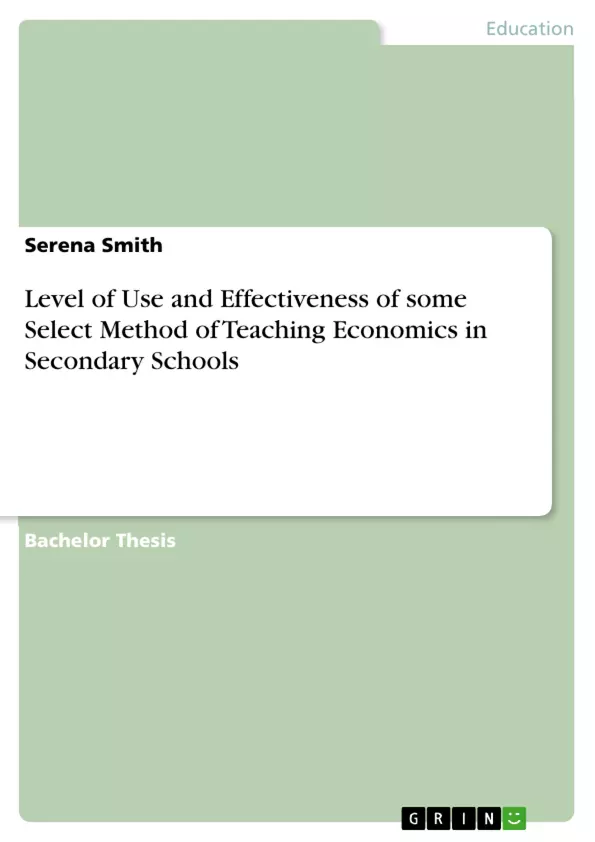[...] According to Kidzu Thomas Oweh, teacher has the greatest potential to influence the
student’s education, while a student achievement is related to teacher’s competence in
using different methods of teaching. Thus, students achieve more when teachers employ
systematic teaching procedures that make teaching and learning processes easier. In other
words, excellent academic per formance by students is not only attainable but could also
be sustained through teacher method of teaching.
These study therefore, examine the level of use and effectiveness of some selected
methods of teaching economics in Lagos state secondary schools, specifically how
teacher’s effectiveness would bring about excellent academic performance through
appropriate use of method of teaching.
The purpose of these research works are stated below:
i. To ascertain how learner attitude affect the method of teaching the students.
ii. To identify the teaching methods, their academic performance and the factors
affecting the students.
iii. To evaluate the effects of method of teaching economics on the performance
of students.
iv. To examine the teacher methods of teaching and their qualification.
v. To know the relationship between teacher methods and learning experience.
vi. To establish relationship between teacher’s methods of teaching economics
and learner academics achievement.
Table of Contents
- Chapter One: Introduction
- 1.1 Background of the Study
- 1.2 Statement of Problem
- 1.3 Purpose of Study
- 1.4 Research Questions
- 1.5 Research Hypotheses
- 1.6 Limitation of the Study
Objectives and Key Themes
This research work aims to investigate the level of use and effectiveness of various teaching methods in economics within Lagos state secondary schools. It explores the relationship between teaching methods, teacher qualifications, student attitudes, and academic achievement in economics.
- Effectiveness of different teaching methods in economics.
- Impact of teacher qualifications and experience on teaching effectiveness.
- Influence of student attitudes on learning outcomes.
- Correlation between teaching methods and student academic performance.
- The role of appropriate teaching methods in fostering effective learning.
Chapter Summaries
Chapter One: Introduction: This chapter lays the groundwork for the research by establishing the context of teaching economics in secondary schools. It highlights the need for effective teaching methods to cultivate student interest and improve learning outcomes. The chapter introduces the problem statement, focusing on the relationship between teaching methods, teacher competence, and student achievement. It outlines the research objectives, questions, and hypotheses, specifically investigating the effectiveness of various teaching methods (problem-solving, discussion, demonstration, role-playing, oral exposition/lecture, discovery, and case study) and their impact on student performance. The limitations of the study, focusing on a specific geographical area (Surulere Local Government, Lagos State), are also clearly defined. The chapter emphasizes the crucial role of appropriate teaching methods in achieving educational goals, underscoring the connection between effective teaching and positive learning outcomes.
Keywords
Teaching methods, economics education, secondary schools, student achievement, teacher effectiveness, academic performance, Lagos State, methodology, learning outcomes, student attitudes.
Frequently Asked Questions: Comprehensive Language Preview
What is the purpose of this research?
This research investigates the effectiveness of various teaching methods in economics within Lagos state secondary schools. It explores the relationship between teaching methods, teacher qualifications, student attitudes, and academic achievement in economics.
What are the key themes explored in this research?
The key themes include the effectiveness of different teaching methods in economics, the impact of teacher qualifications and experience, the influence of student attitudes on learning outcomes, the correlation between teaching methods and student academic performance, and the role of appropriate teaching methods in fostering effective learning.
Which teaching methods are investigated?
The research investigates the effectiveness of several teaching methods including problem-solving, discussion, demonstration, role-playing, oral exposition/lecture, discovery, and case study.
What is the geographical scope of this study?
The study is limited to Surulere Local Government in Lagos State.
What are the main research questions and hypotheses?
While not explicitly stated in the provided summary, the research aims to determine the effectiveness of various teaching methods and their impact on student performance. Specific research questions and hypotheses are detailed in Chapter One.
What are the limitations of the study?
A key limitation is the geographical focus on Surulere Local Government, Lagos State. Other limitations may be detailed in Chapter One.
How is the research structured?
The research includes an introduction (Chapter One), which details the background, problem statement, purpose, research questions, hypotheses, and limitations. Further chapters (not summarized here) likely delve deeper into the methodology and findings.
What are the key findings (summary)?
The provided text does not include the research findings. Chapter summaries would offer a detailed overview of the results of each chapter, upon completion of the research.
What are the keywords associated with this research?
Keywords include: Teaching methods, economics education, secondary schools, student achievement, teacher effectiveness, academic performance, Lagos State, methodology, learning outcomes, student attitudes.
- Quote paper
- Serena Smith (Author), 2010, Level of Use and Effectiveness of some Select Method of Teaching Economics in Secondary Schools, Munich, GRIN Verlag, https://www.grin.com/document/178382



